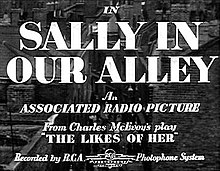
Dame Gracie Fields was an English actress, singer, comedian and star of cinema and music hall who was one of the top ten film stars in Britain during the 1930s and was considered the highest paid film star in the world in 1937. She was known affectionately as Our Gracie and the Lancashire Lass and for never losing her strong, native Lancashire accent. She was appointed a Commander of the Order of the British Empire (CBE) and an Officer of the Venerable Order of St John (OStJ) in 1938, and a Dame Commander of the Order of the British Empire (DBE) in 1979.
Maurice Elvey was one of the most prolific film directors in British history. He directed nearly 200 films between 1913 and 1957. During the silent film era he directed as many as twenty films per year. He also produced more than fifty films – his own as well as films directed by others.

What a Crazy World is a 1963 film directed by Michael Carreras and starring Joe Brown and Sausan Maughan. The script is by Carreras and Alan Klein, from the latter's stage play. It is a pop musical featuring a number of late 1950s and early 1960s musical performers, including an appearance by Freddie and the Dreamers.

The Shakedown is a 1959 black and white British crime-drama film directed by John Lemont, starring Terence Morgan, Hazel Court, and Donald Pleasence. A ruthless crook runs a blackmail operation, falls for an undercover cop, and is murdered by one of his victims.

Once a Sinner is a 1950 British drama film directed by Lewis Gilbert and starring Pat Kirkwood, Jack Watling and Joy Shelton.
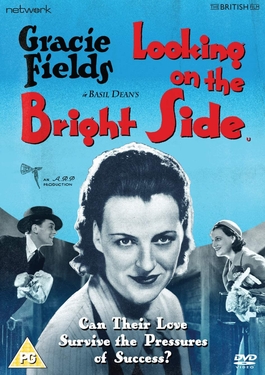
Looking on The Bright Side is a 1932 British musical comedy film It was directed by Graham Cutts and Basil Dean and starring Gracie Fields, Richard Dolman and Julian Rose.
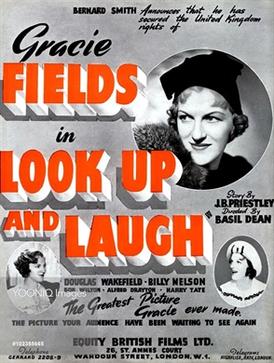
Look Up and Laugh is a 1935 British comedy film directed by Basil Dean and starring Gracie Fields, Alfred Drayton and Douglas Wakefield. The film is notable for featuring an appearance by Vivien Leigh in an early supporting role.

The Narrowing Circle is a 1956 British crime film directed by Charles Saunders and starring Paul Carpenter, Hazel Court and Russell Napier. It is based on the 1954 novel of the same title by Julian Symons. A crime writer finds himself framed for murder.
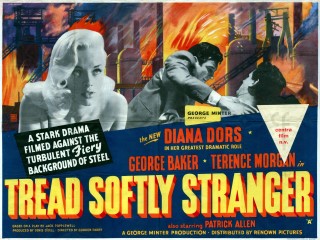
Tread Softly Stranger is a 1958 British crime drama directed by Gordon Parry and starring Diana Dors, George Baker and Terence Morgan. The film was shot in black-and-white in film noir style, and its setting in an industrial town in northern England mirrors the kitchen sink realism movement coming into vogue in English drama and film at the time. The screenplay was adapted from the stage play Blind Alley (1953) by Jack Popplewell.

Svengali is a 1954 British drama film directed by Noel Langley and starring Hildegard Knef, Donald Wolfit and Terence Morgan, based on the 1894 novel Trilby by George du Maurier. Svengali hypnotises an artist's model into becoming a great opera singer, but she struggles to escape from his powers. It was distributed in the United States by Metro-Goldwyn-Mayer.

The Gang's All Here is a 1939 British black-and-white comedy-mystery, directed by Thornton Freeland and starring Jack Buchanan and Googie Withers. It was produced by Associated British Picture Corporation and released in the U.S. in 1943 as The Amazing Mr. Forrest.
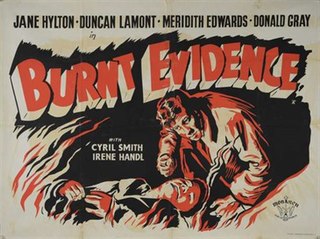
Burnt Evidence is a 1954 British thriller film directed by Daniel Birt and starring Jane Hylton, Duncan Lamont and Donald Gray. It was produced by Ronald Kinnoch for ACT Films. It was made as a second feature.

You Lucky People! is a 1955 British comedy film directed by Maurice Elvey and starring Tommy Trinder, Mary Parker and Dora Bryan. Originally titled Get Fell In, the film was renamed to match Trinder's familiar catchphrase. It was shot in a rival French process to CinemaScope, called 'CameraScope', with the attendant publicity describing "the first feature to be made with an anamorphic lens in black and white! It's a camerascoop!". It was shot at Beaconsfield Studios near London with sets designed by the art director Ray Simm.

This Week of Grace is a 1933 British comedy film directed by Maurice Elvey and starring Gracie Fields, Henry Kendall and John Stuart. The screenplay concerns a poor, unemployed woman who is made housekeeper at the estate of a wealthy duchess. It was promoted with the tagline "Cinderella in modern dress". It includes songs written by Harry Parr-Davies, including "My Lucky Day" and "Happy Ending".

A Honeymoon Adventure is a 1931 British thriller film directed by Maurice Elvey and starring Benita Hume, Peter Hannen and Harold Huth. Written in collaboration by Rupert Downing and Basil Dean, it The film was shot at Beaconsfield Studios. Location shooting, including the railway scenes took place in Scotland.

Fred Groves was a British actor of the celebrated Groves acting family. On stage from 1896, he appeared in the original West End production of Noël Coward's Cavalcade (1931-2); and was a leading man in silent films, latterly becoming a character player in movies. He appeared in the 1925 play Number 17 in the West End.
Sally in Our Alley may refer to:
Archie Pitt was a British music hall performer, showman and talent agent. He is best known for his marriage to Gracie Fields whose career he managed.
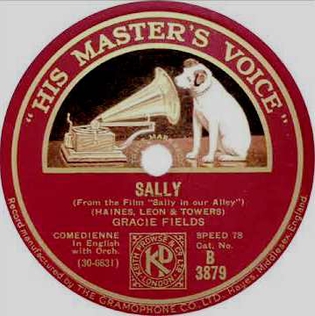
"Sally" is a popular song written by Leo Towers, Harry Leon and Will E. Haines. It was first sung by Gracie Fields in the 1931 film Sally in Our Alley. "Sally" was released on His Master's Voice as the B-side of the record "Fall In and Follow the Band".
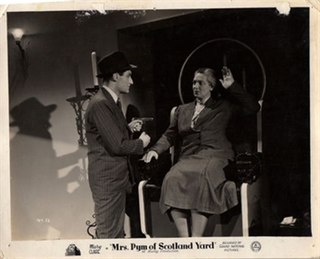
Mrs. Pym of Scotland Yard is a 1939 British comedy-drama film directed by Fred Elles starring Mary Clare in her only title role and Nigel Patrick in his film debut.. It is based on the Mrs Pym novels by Nigel Morland, and written by Morland, who re-used the title for a 1946 book.
